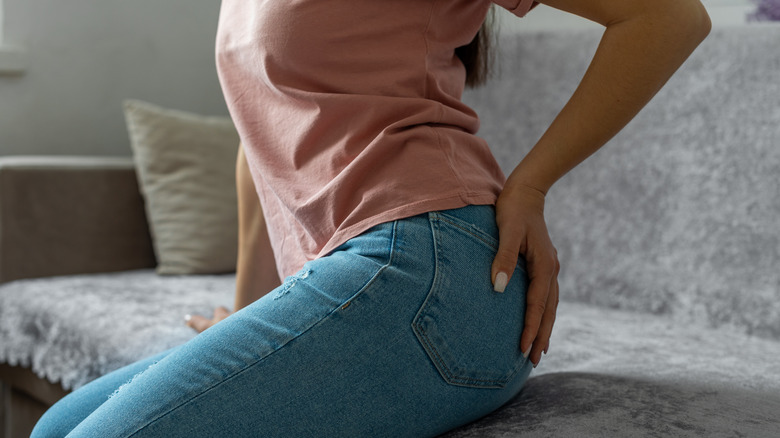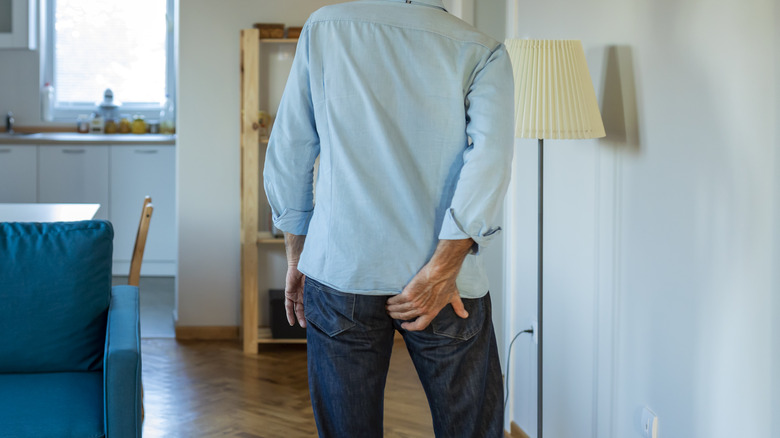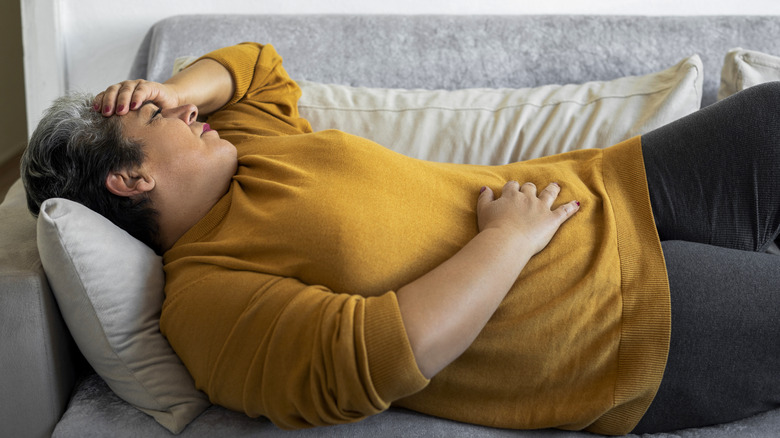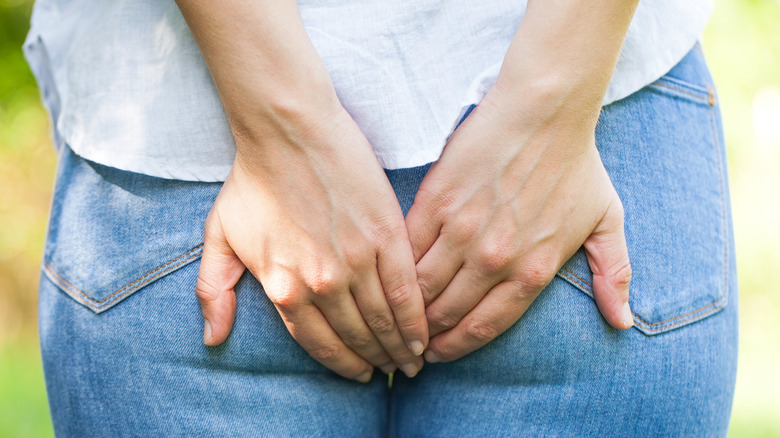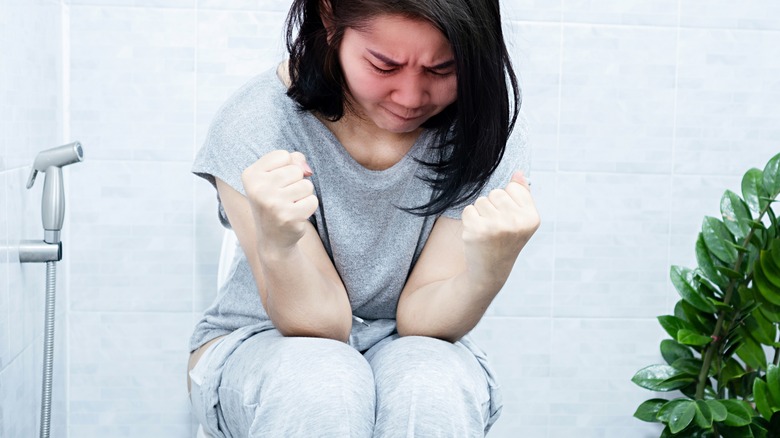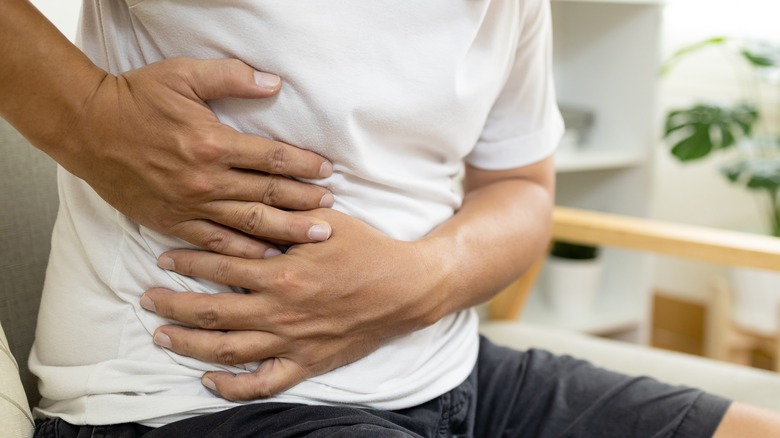What Happens To Your Body When You Hold Your Poop
Sometimes, when nature calls, we can't always answer right away. Maybe we're stuck in traffic, at an important meeting, or having dinner with the in-laws. Whatever the case may be, there are occasional circumstances in which we just have to fight back that urge to poop. However, it is not advisable to hold in your poop for too long, as it can lead to a wide array of health risks and, in extreme cases, even death. According to the BBC, a 16-year-old girl died in 2015 after not defecating for three months.
Everyone's bathroom-use habits are different, but Healthline notes that going an average of three times a day or even thrice weekly is generally considered normal in terms of bowel movement. There are some extreme cases, such as the one discussed in a 2010 study published in the Journal of Neurogastroenterology and Motility. That study revealed that one woman went 75 whole days without a bowel movement. However, cases like that most definitely represent the exception and not the rule. For the average person, holding in your poop can wreak havoc on your body in some pretty unpleasant ways.
Constipation
When you hold in your poop for an extended period of time, the water inside your stool eventually dries out, turning it hard and making it much more difficult to pass. Over time, according to the National Health Service, constipation can lead to a variety of health problems, including rectal bleeding, swelling of the rectum, incontinence, and, in more serious situations, rectal prolapse.
According to the Mayo Clinic, if you find yourself suffering from constipation, you should increase the amount of fiber in your diet. More fiber means more volume for your stools, which makes them easier to pass. Additionally, you should add more physical exercise to your diet, which will help keep your intestines moving. You can also try laxatives, stool softeners, and fiber supplements to get things moving down there. However, the best thing you can do to ensure that constipation doesn't become a problem for you is to make sure you listen to the urge to poop whenever it arises.
Hemorrhoids
Once your poop becomes hard and difficult to pass, it can lead to an unnecessary strain being put on the veins around the rectum and anus, according to Temple Health. This straining can be caused by trying to push too hard or even just by sitting for too long. And when these veins become inflamed, they form hemorrhoids. Once they crop up, hemorrhoids can be a great source of discomfort, causing pain, itching, and even bleeding in the anal region.
Despite the pain that hemorrhoids can cause, Harvard Medical School notes that you should not continue holding in your bowel movements. Doing that can make constipation even worse, which will do very little to alleviate the discomfort of your hemorrhoids. Additionally, you may want to consider using something to prop up your feet while you are on the toilet, which will help take some of the pressure off your rectum and ease your pain.
Fissures
When stool dries up and hardens, straining to pass it can lead to small tears in the anal lining (via the Mayo Clinic). These fissures can lead to pain during and after bowel movements, bloody stools, and visible tears around the anus. According to Family Doctor, in addition to being caused by constipation and straining, these fissures can also stem from excessive diarrhea, which can decrease the flow of blood to the anal lining.
If you find yourself suffering from anal fissures, you need to get your bowels moving again, as noted by the Memorial Sloan Kettering Cancer Center. This starts by adding fiber to your diet or taking fiber supplements such as psyllium husk. You can also try to soften your stool by drinking plenty of water. In addition, warm baths can help ease some of the discomfort around your anus. In more extreme cases, medication may be needed. Talk to your doctor about treatment if your fissures don't ease up with home remedies.
Abdominal pain
When you hold in your poop for too long, the bacteria in your gut will try to break it down, leading to a buildup of gas, according to Yale Medicine. As the gas fills your abdomen, it can lead to painful bloating and distension. A 2015 study published in the Danish Medical Journal also showed that more poop in the colon can lead to a higher bacteria count, meaning that the amount of gas in your colon will also increase over time.
This gas pain can be very severe, Cedars Sinai notes. If the gas is primarily located on the left side of your colon, the discomfort can be severe enough to make a person think that they are suffering from a heart problem. Pain on the right side can be intense enough to mimic the symptoms of a gall bladder attack or even appendicitis. In addition to the pain, a buildup of gas in the colon can lead to some embarrassing side effects, including excessive belching and flatulence.
Rectal distension
There is only so much room inside your body, and the more stool that builds up, the more the walls of your rectum will become stretched. This stretching can lead to rectal distension, which, over time, can cause a condition known as rectal hyposensitivity. According to Cleveland Clinic, this condition is marked by a lack of sensation in the rectum and can result in some serious side effects, including a dysfunction known as dyssynergic defecation. This is a condition in which it becomes harder and harder to have a bowel movement and can result in chronic constipation.
In serious situations, people with distention or who are constantly straining to poop can experience rectal prolapse. When this happens, the rectum is turned inside out and actually protrudes out from the anus. Prolapse can lead to bleeding and ulceration of the rectum, the inability of the rectum to be pushed back into the body, or even gangrene or death of the rectal tissue.
Fecal impaction
If you keep holding in your poop, you can move past constipation to a much more problematic condition known as fecal impaction. According to WebMD, when people suffer from fecal impaction, the stool becomes so hard and immovable that it can be next to impossible to pass out normally. Left unaddressed, this condition can become very serious, resulting in a number of problems, including fever, confusion, and tachycardia.
If your poop holding reaches the point where you develop fecal impaction, Cleveland Clinic says that you have a few options available to you. You can try laxatives or an enema to get things moving again, for starters. If that doesn't work, you may have to go with a physically assisted removal. In those cases, your doctor may massage your abdomen to loosen stubborn stool or, in extreme cases, actually insert a finger into your rectum to dislodge impacted feces. If none of these methods produce results, you may have to consider a surgical solution to avoid perforating your bowel.
Risk of appendicitis
As shocking as it may seem, excessively holding on to your stool could land you in the hospital with appendicitis. According to a 2022 study published in Case Reports in Gastroenterology, the primary culprits in this particular situation are hardened pieces of fecal material known as fecaliths. These fecaliths are caused by difficulty passing stool and can lead to serious complications, including intestinal obstruction and, yes, appendicitis.
A 2015 study published in the Danish Medical Journal showed that patients who suffered from gangrenous or perforated appendixes also had fecaliths present in the colon. Another 2015 study, this one published in the Canadian Journal of Surgery, showed that patients in that particular study who suffered from acute appendicitis also had the presence of fecaliths. When a fecalith ends up in the appendix, it forms what is known as an appendicolith. The Journal of Surgical Research notes that appendicoliths are known to cause acute appendicitis, and are present in more than 40% of patients.
Urinary problems
According to the urology department at the University of California, San Francisco, the nerves that control the functions of both the bladder and the bowels are connected, and both the colon and the bladder are located near each other in the body. When stool gets backed up in the colon, it can begin to squeeze down on the bladder and either keep it from filling up properly or empty it prematurely.
In addition to having bladder problems, having too much stool packed in your body can also lead to urinary tract infections (UTIs). In a 1995 study published in Archives of Disease in Childhood, researchers studied radiology results of children who presented with UTIs. The children who suffered from UTIs had a higher concentration of feces in their bodies than the control group. These results were bolstered by a 2023 study published in Acta Paediatrica, which showed that nearly half of children who suffered from a kidney infection known as pyelonephritis also had constipation.
Increased risk of colon cancer
The jury is still out as to whether or not constipation and holding in your poop directly cause cancer, but there are some studies that show that it is distinctly possible. A 2012 study by the American College of Gastroenterology found that colorectal cancer and benign tumors were more common in chronically constipated patients than in those who did not suffer from constipation. Additionally, the risk of developing cancer of the colon was 1.78 times higher in patients who suffered from constipation.
On the other hand, a 2019 study published in Clinical Epidemiology showed that, while the short-term risk of developing gastrointestinal cancer was greater in constipated patients, that risk dropped significantly over the course of a year. What constipated people may want to be more concerned with, Samitivej Hospitals reports, is the fact that not being able to pass stool could actually be a sign that you already have colon cancer. If you are having difficulty having a bowel movement, you should consult your doctor right away to ensure that nothing serious is happening.



